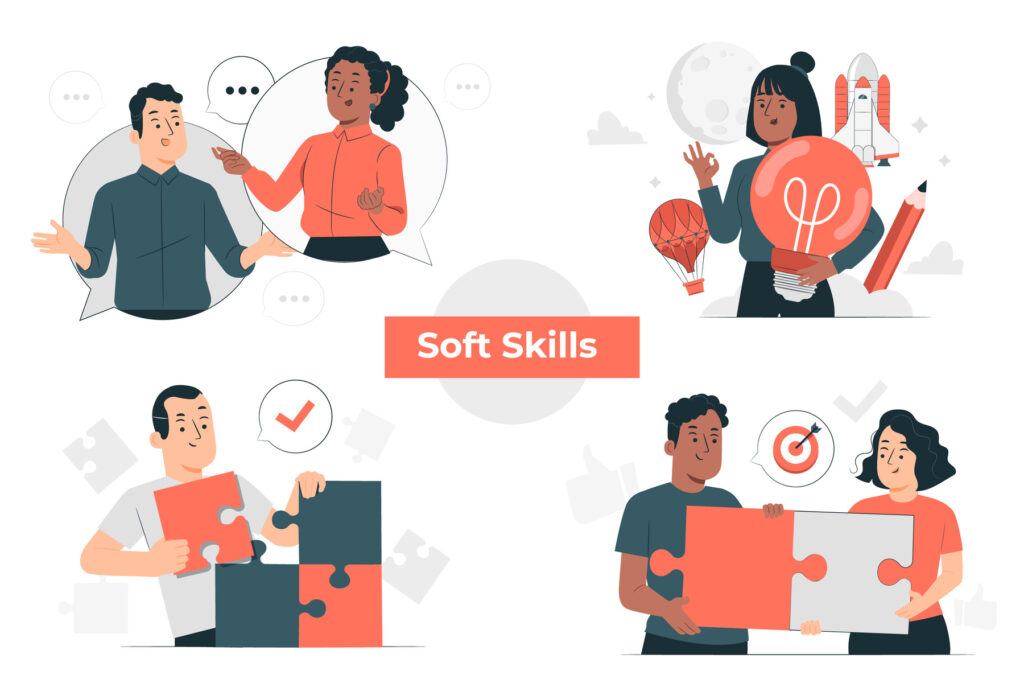
From resumes to resilience: Embracing the soft skills revolution
“In a high-IQ job pool, soft skills like discipline, drive and empathy mark those who emerge as outstanding” — Daniel Goleman
A recent conversation with an executive friend left me shaken. Her company was downsizing. She confided in me, “Facing my team to tell them their roles are being eliminated is the hardest thing I’ve ever had to do. Coding was child’s play compared to this.” Her words struck a chord — a stark reminder of the power of communication and human connection, and how, though crucial, these skills are often overshadowed by the fanfare surrounding technical skills.
There is no denying that flourishing, and even enduring in a professional setting demands more than just technical proficiency. While technical skills may open the door, it is soft skills, the unsung heroes, that keep you there. You and the workplace both need a well-rounded skill set that blends technical skills with interpersonal expertise.
A little more about these two skill categories…
Technical skills, often referred to as hard skills, include capabilities such as coding, video editing, data analysis, scientific writing, etc., and help execute specific tasks at a workplace.
On the other hand, interpersonal skills (referred to as soft skills) aid in navigating intricate challenges at the workplace. A few of them are:
- Communication: The ability to convey ideas clearly and effectively, both verbally and in writing.
As Nat Turner puts it, “Good communication is the bridge between confusion and clarity.” - Teamwork: Collaborating with others, contributing to group efforts, and fostering a positive working relationship.
- Attitude: Maintaining a positive and adaptable mindset significantly impacts personal and team dynamics; Winston Churchill concurs, for he once proclaimed, “Attitude is a little thing that makes a big difference.”
- Critical thinking: Evaluating information, making informed decisions, and solving problems using logical reasoning.
- Problem solving: Identifying challenges, analysing them, and developing effective solutions.
- Time management: Efficiently organising and prioritising tasks to maximise productivity and meet deadlines.
“People who are high performers have the discipline to structure their day, and to be highly effective within a set time frame,” says Eric Frazer, author of The Psychology of Top Talent, and assistant professor of psychology at Yale University School of Medicine.
- Empathy: Understanding and considering others’ perspectives and emotions, fostering a supportive work environment.
The list is not exhaustive since there is no definitive list of soft skills. Any skill that helps you cope with a difficult situation or makes you pleasant to work with can be added to this list.
The powerful impact of soft skills
When two candidates possess similar technical skills, the spotlight shifts to soft skills. These intangible qualities separate good employees from the truly remarkable, which is why employers increasingly prioritise them alongside technical competency.
Consider the daily pressure of deadlines, saying “no” with grace (a surprisingly crucial and challenging skill!), collaborating with diverse teams, and navigating demanding clients. Hard skills alone do not suffice in these complex situations. The subtle hands of soft skills are needed to ease conflicts, foster collaboration, and ensure smooth progress.
Their magic lies in human connection. Strong soft skills enhance team dynamics, create a positive work atmosphere, and build bridges with clients. Unlike their technical counterparts, soft skills boast remarkable versatility. Whether a doctor, scientist, or accountant, effective communication, adaptability, and problem-solving are universal currencies for professional success. From entry-level roles to leadership positions, these transferable skills reign supreme in a world of constant change.
Research validates the power of soft skills. Harvard University, the Carnegie Foundation, and Stanford Research Center report that 85% of job success hinges on strong soft and people skills, while only 15% depends on technical expertise. The message is clear: in today’s dynamic environment, soft skills are no longer soft options; they are the backbone of exceptional performance.
Neglecting these skills is not just a missed opportunity; it is a costly proposition. Communication breakdowns, team conflicts, and missed potential — these are the hidden costs of ignoring the power of soft skills.
Crafting an effective soft skills assessment toolbox
“We refer to them as ‘power skills’, because without them, people’s technical skills are not running on all cylinders.” — Heidi Abelli, SVP, Product development, Skillsoft
Clearly, there is a lot riding on soft skills. A technically adept employee with poorly developed human skills will not last long in an organisation, and that is an HR nightmare. And this is not the biggest recruitment challenge.
Technical prowess shines on resumes, but soft skills often remain hidden. Unearthing these diamonds in the rough is the new frontier of recruitment. Forget checking boxes; evaluating soft skills demands innovative methods to reveal the potential that traditional interviews miss. Here are some ways to effectively assess soft skills:
Situational questions and examples:
- Critical thinking: “Describe a situation at work when you had to resolve a complex problem. How did you approach it? What steps did you take to analyse the situation and find a solution?”
- Teamwork: “Think back to a successful team project. How did you contribute to the team’s dynamic? What specific actions did you take to ensure collaboration and achieve shared goals?”
- Communication: “Tell me about a time you had to explain a complex technical concept to someone with no prior knowledge. How did you tailor your communication to ensure clarity and understanding?”
- Leadership: “Describe a situation where you led a team or initiative. How did you motivate and inspire others to achieve their best?”
Job-relevant scenarios and simulations:
- Presentation exercise: Give candidates a real-world presentation scenario they might encounter in the role. Assess their public speaking skills, organisation, and ability to handle questions.
- Role-playing: Simulate a challenging customer interaction or team conflict. Observe how candidates respond, communicate, and adapt to pressure.
- Case studies: Present realistic work-related cases and ask candidates to analyse them and propose solutions. Evaluate their problem-solving approach, critical thinking, and decision-making skills.
Standard personality assessment examples:
- Myers-Briggs type indicator (MBTI): Identifies personality preferences and potential strengths/weaknesses related to communication, teamwork, and leadership.
- HEXACO personality inventory: Measures six core personality traits (Honesty-Humility, Emotionality, Extraversion, Agreeableness, Conscientiousness, Openness to Experience) and reveals potential strengths and weaknesses in areas like interpersonal skills, stress management, and decision-making.
- Sixteen Personality Factor Questionnaire (16PF): Analyses five major personality factors (Extraversion/Introversion, Emotional Stability/Neuroticism, Dominance/Submission, Conscientiousness/Carelessness, Openness to Experience/Closedness to Experience) and their 16 sub-factors, providing insights into communication styles, teamwork dynamics, and leadership potential.
- Emotional Intelligence tests: Provide insights into self-awareness, social awareness, and relationship management skills.
Body language:
- Observe posture, eye contact, and gestures during interviews and assessments. Hesitation, nervous ticks, or lack of eye contact might indicate nervousness or discomfort, while confident engagement and active listening convey openness and communication skills.
Written tests and group discussions:
Problem-solving prompts: Challenge candidates with written scenarios or case studies, evaluating their critical thinking and analytical skills.
Group discussions: Observe how candidates participate in a structured discussion, assessing their communication, collaboration, and conflict resolution skills.
Examples of written tests:
- Situational judgement tests (SJTs): Candidates choose the most appropriate response to various work-related situations, revealing their decision-making and interpersonal skills.
- Workstyle assessments: Identify preferred work styles and potential compatibility with the company culture and team dynamics.
Examples of Group Discussions:
- Brainstorming sessions: Assess creativity, communication, and ability to contribute constructively to a group effort.
- Debates or panel discussions: Evaluate critical thinking, communication skills, and the ability to handle opposing viewpoints.
Bonus:
- Gamified Assessments: Interactive simulations can engage candidates and provide valuable data on decision-making, problem-solving, and teamwork skills under pressure.
Remember, effective assessment is a combination of methods. By utilising a variety of tools and exercises, you can gain a comprehensive picture of a candidate’s soft skills and make informed hiring decisions that go beyond technical expertise.
Additional tips:
- Calibrate your assessments: Ensure they are relevant to the specific role and required skills.
- Maintain transparency: Explain the purpose of each assessment and how it will be used in the hiring process.
- Provide feedback: Share the results of the assessments with candidates, offering insights for development.
By implementing these strategies, you can ensure that your assessment process identifies not just the most technically qualified candidates, but also those with the right soft skills to thrive in your organisation.
Conclusion
We have peeled back the layers, delved into the often overlooked realm of soft skills, and unearthed their hidden power. It is time to move beyond resume scanning and technical checklists. The future of hiring demands a revolution.
Look for the team player who builds bridges, the critical thinker who navigates complexity with grace, the problem-solver who thrives in the face of the unknown.
These skills weave the tapestry of a thriving organisation.
Investing in soft skills assessment is not a cost; it is a catalyst. It is unlocking the potential of your workforce, fostering collaboration and innovation, and building teams that adapt and thrive in the ever-evolving business landscape. It is about creating a culture where emotional intelligence fuels empathy and understanding, where communication is not just words but a bridge to shared goals.
The call to action is clear: embrace the power of soft skills. Invest in your own development, advocate for their importance in hiring practices, and nurture them within your organisation. In a world where technical expertise is readily available, it is the human touch that will truly set you — and your team — apart.
References:

